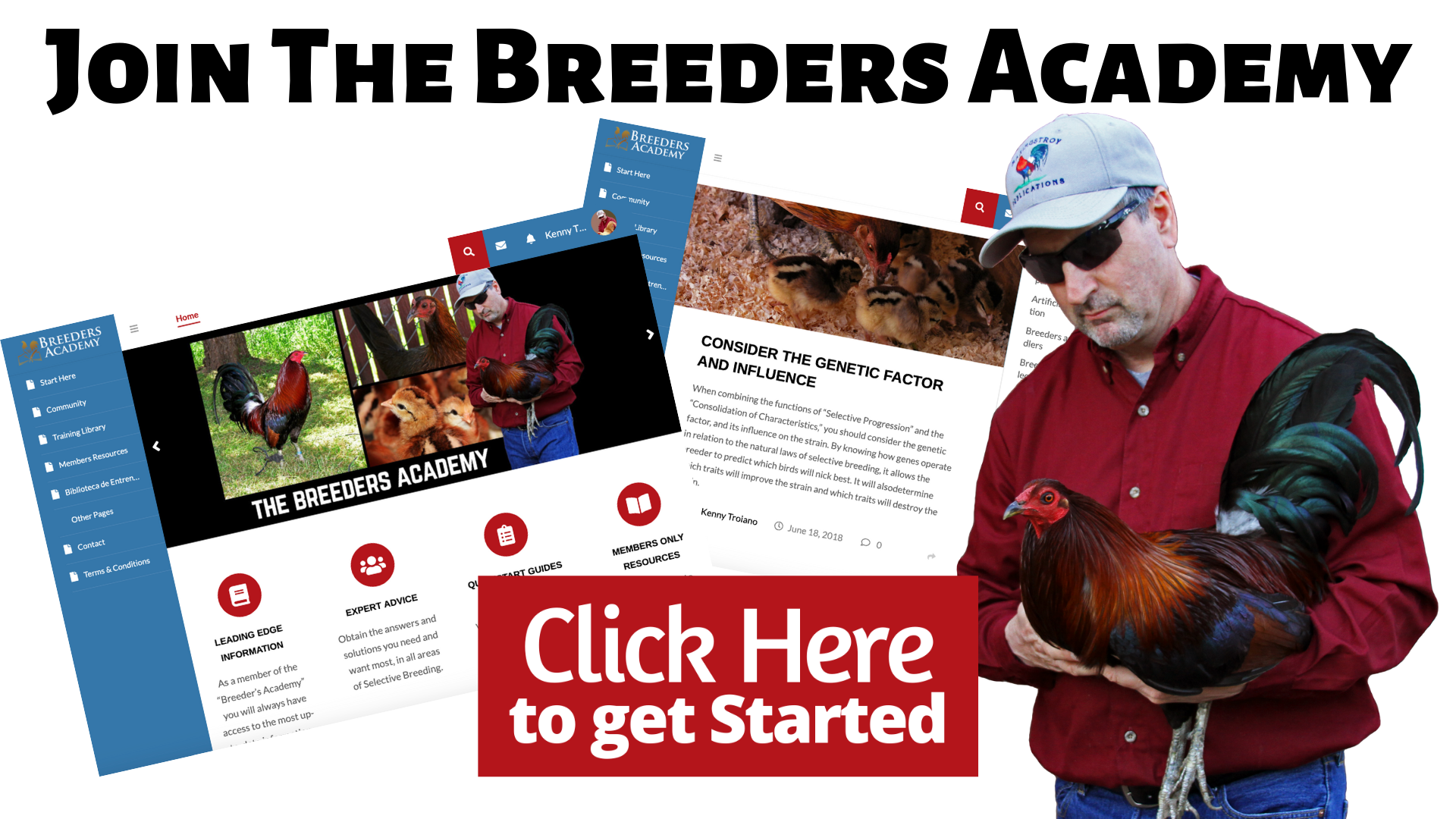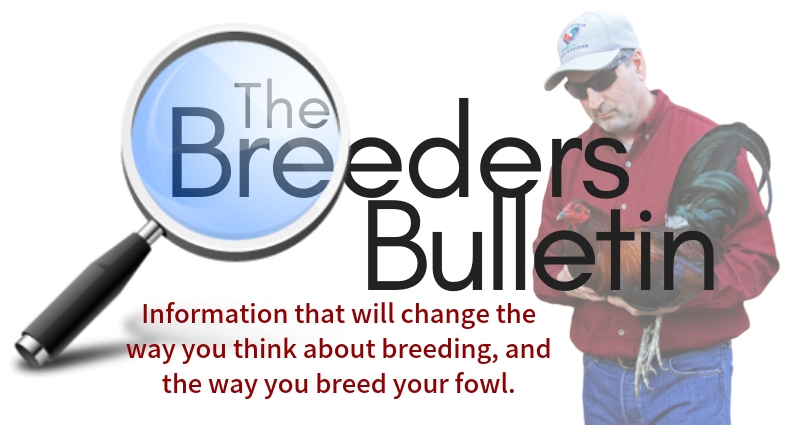I QUIT!
10 reasons to abandoned a strain and start over
(and, when is it time to create a new strain)
Not to worry, I’m not quitting, but there may be a time when you might want to abandon your present strain and start over. Here’s some good information that I think you will find very interesting.
I usually say – “if you have one good cock and one good hen, then you have what’s necessary to create or improve a strain.
If they have the desirable traits, then you should breed them and produce as many offspring as possible. Once you have a good number of offspring, select the standouts that have the ability to improve and perpetuate the strain.
If you select properly and resist the temptation to add or infuse outside blood, within a few years, you should have a fairly good foundation. Continue the process, and in time you will have a strain that you can be proud of.
On the other hand, I’ve seen so many breeders trying to perpetuate a family from fowl that simply do not have what it takes to become a true strain. They either have many faults, or they don’t have the proper traits. They simply do not represent their breed and variety.
Is there a time to abandon the line and start over?
Yes! I don’t take this question lightly. But if you are not seeing progress from year to year, or they seem to be getting worse, you may need to face the fact that it’s time to cull the entire line and start over.
HERE ARE 10 REASONS WHY IT MAY BE BEST TO ELIMINATE THE LINE AND START OVER
- WHEN YOU ARE NOT SEEING PROGRESS FROM YEAR TO YEAR
- The offspring should be better than the parents each year. If not, you are going in the wrong direction.
- The progress can be small, but you must see some improvement.
- No progress or development in the wrong direction is a sign of regression or degeneration. This is when throwbacks from distant ancestors, which are usually recessive, are blocking your selection.
- WHEN YOU ARE CULLING MORE THAN 75% OF THE OFFSPRING EACH YEAR – WITH NO IMPROVEMENT
- As long as you are getting a few standouts, you can progress your strain. But when a majority of the offspring are culls, it is very difficult to find those standouts.
- Defects and disqualifications can stop progression in its tracks. You cannot progress a family if you can’t correct a fault, which are recessive and impossible to eliminate, especially when the entire family carries the defective trait.
- Poor health can hold a strain back, and depending on the disease, it can even destroy the strain.
- WHEN ALL THE BIRDS IN YOUR STRAIN EXPRESS THE SAME GENETIC DEFECT.
- Never breed to birds expressing a defect. Defects are recessive and are impossible to eliminate
- Cull all defects
- WHEN THEY SIMPLY DO NOT HAVE THE PROPER GENETIC FACTORS
- If you get on the wrong side of genetics, it is very difficult to recover.
- Some traits block or eliminate others. These include – dominant or recessive
- Some traits are hard to improve and easy to lose.
- Some traits are of lower or higher intensity, in other words, they are measurable as seen in a bell-shaped curve. These include – quantitative traits (known as polygenic traits) which are the result of multiple gene or alleles.
- You cannot perpetuate a trait that does not exist. In other words, you cannot produce a trait if they don’t have the genes already inside them. If you need to introduce new blood to acquire the desirable genes/traits, then you are starting over.
- Some traits are determined by the father, while others are determined by the mother. These include:
- sex-linked traits
- lethal genes
- mitochondria DNA – the power house of the cell
- WHEN ALL YOUR COCKS ARE MAN-FIGHTERS OR ALL YOUR HENS ARE FLIGHTY OR HIGH STRUNG.
- Temperament is a polygenic trait, which is inheritable
- Can be improved through selection
- Start by cull all man-fighters and flighty or high-strung hens
- WHEN THE STAIN IS GETTING TOO SMALL OR WEAK
- This can be due to lack of vigor
- This is usually due to poor selection – not inbreeding
- If you are breeding to the largest birds of the strain, and are not seeing improvement in size, then they must be eliminated
- WHEN THEY NO LONGER ARE GOOD REPRESENTATIONS OF THEIR BREED.
- They must be true representations of their breed, variety and strain
- The standard of perfection gives you a good depiction of what the breed should look like.
- They must express all their breeds characteristics and traits, such as:
- Conformation of body (polygenic)
- Broodiness (dominant and polygenic)
- Comb type (dominant and recessive)
- Color of plumage (dominant and recessive)
- Leg color (dominant and recessive)
- Performance ability (polygenic)
- WHEN THE HATCHABILITY RATE IS LOW
- You cannot perpetuate a strain that cannot reproduce
- They lack vigor, or they don’t hatch
- Fertility is about the cock
- Hatchability is more about the hen
- Factors:
- Health can be a factor
- Nutrition can be a factor
- Age can be a factor
Can it be genetic?
- Hatchability is a hereditable (Quantitative/Polygenic) trait
- Can be improved through selection
- Fertility is not heritable
- Lethal genes can also be a factor – and is heritable
- WHEN THEY LACK VIGOR AND VITALITY
- Vigor can be improved through selection
- Having multiple lines with in a strain and line-crossing can improve genetic diversity and vigor.
- Inbreeding depression can accentuate lack of vigor, but selection can eliminate inbreeding depression and improve vigor
- Signs of inbreeding depression:
- Chicks that are listless
- Lack vigor
- Sickly
- Or, they don’t hatch
- WHEN HARMFUL DISEASES ARE IN YOUR YARD:Once these diseases get into your yard, they are impossible to eliminate. The only way to eliminate most of these diseases is to depopulate, clean and start over.
- Some diseases are passed through:
- The egg,
- Some are passed from bird to bird,
- And some are passed by you.
- If they are highly susceptible to diseases, such as;
- Marek’s
- Coccidiosis
- Diseased to avoid at all cost:
- Most respiratory diseases
- Mycoplasma
- Coryza
- Laryngotracheitis
- New Castles Disease
- How to avoid these problems?
- Keep a closed yard
- Don’t outcross with birds from other breeders
- Practice good biosecurity
- Eliminate wild birds and rodents
- If you must bring in new birds (or returning birds) – you must quarantine them – use my “30-30 rule” – 30 days solo quarantine/30 days with sacrificial bird.
- Some diseases are passed through:
TO BE SUCCESSFUL – YOUR STRAIN MUST BE:
- Healthy and vigorous
- Free of defects and disqualifications
- Uniform and consistent in all their characteristics and traits
- Good representations of their breed
- Have good temperament
WHAT CAN YOU DO TO IMPROVE YOUR CHANCES OF SUCCESS?
- Create a healthy environment:
- Well-built brood pens
- Clean litter that is dry and free of molds
- Keep a closed yard – biosecurity
- Start with good seed fowl:
- Purchase fowl from a reputable breeder
- Select fowl that best represents you
- Select fowl that are good representatives of their breed
- Do not introduce outside blood:
- Create a breeding program that promotes purity of blood
- Use breeding methods that progresses your strain
- Never rely on fowl of other breeders
- Don’t play the name game
- Improve your ability to select the proper brood fowl
- Know your breed
- Learn what to select for and why
- Be willing to cull ruthlessly
- Take the necessary steps to create a well-bred foundation strain.
- Improve your knowledge and skills as a breeder
- Begin using well planned breeding programs that utilize a combination of breeding methods at precise stages to achieve a specific result.
- Have a qualified mentor that can guide you step by step through the breeding process
- This last step – create a well-bred foundation strain – this is what we teach at the Breeders Academy.
Everyone knows about inbreeding, linebreeding, outcrossing and infusion. But, no one knows why they are doing it, or when they should do it. They think those methods are the means to the end, when in reality, they are only tools used in a bigger more complete breeding program.
For example, line-breeding is a fantastic tool, but when used alone, it only creates a bigger, more problematic situation, one that can ruin your strain in the long run. You cannot line-breed forever. And, if you introduce outside blood, you will destroy all your efforts, and the time and money spent trying to create a strain.

